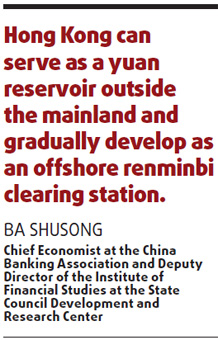Long-term global yuan prospects good
Updated: 2009-11-25 07:32
By Ngai Tungsing(HK Edition)
|
|||||||||
HONG KONG: The internationalization of the yuan and broad expansion of its role beyond mere trade settlement into investment arenas would have profound, global consequences.
Addressing this issue, Professor Ba Shusong, chief economist at the China Banking Association and deputy director of the Institute of Financial Studies at the State Council Development and Research Center, said in an interview with Bauhinia magazine that the renminbi has met the basic requirements to become internationalized, although the process may take a long time.
Reporter: How did the global financial crisis last year impact the internationalization of the renminbi?
Ba: The internationalization of the renminbi means that yuan can be freely circulated outside the mainland, while the currency will also be used in international valuation, settlement and reserve.
The renminbi has started to internationalize in 2009, as the financial turmoil has triggered global economic readjustment and as China extends the process of building up its economic strength that began with the economic reform 30 years ago.

If the international currency system does not restructure itself in the short term, China may need to take a higher profile in agenda setting, in order to protect the country's interests. In the medium term, the development of financial markets in China also includes the internationalization of the entire financial market. In the long term, the internationalization of yuan should speed up.
Reporter: How did the national sovereign bonds issued in Hong Kong benefit the internationalization of the renminbi?
Ba: Hong Kong and Macao have already started trade settlements in yuan, while the Ministry of Finance has also issued national sovereign bonds in Hong Kong. These measures can help to establish offshore renminbi markets and gradually expand yuan services from payment to exchange and investment activities. These measures, therefore, are the extensions of yuan internationalization.
At present, Hong Kong has already developed as the place with the highest circulation of renminbi as well as the most complete yuan business outside the mainland. The basis of renminbi business in Hong Kong is sound.
As cross-border yuan trade settlements become more common, and together with the diversification of renminbi financial products, other countries and regions may choose to settle trades in renminbi in Hong Kong.
Since Hong Kong does not have any regulation of foreign exchange and capital can move in and out of the city freely, renminbi from other countries is expected to flow into the city. Hong Kong can, therefore, serve as a yuan reservoir outside the mainland and gradually develop as an offshore renminbi clearing station.
The development of the offshore Renminbi market in Hong Kong will also bring new momentum to the city's financial industry.
Reporter: What are your views concerning the outlook and prospect of yuan internationalization?
Ba: Regarding the formation of an international currency, the internationalization of the renminbi is imposing very heavy responsibilities. The enhancement of yuan internationalization will bring greater opportunities for enterprises to expand their international business. Therefore, we should set a clear time frame in which to restrain and boost the internationalization.
The final outcome of the yuan's internationalization may seem to depend on the overseas market, but the genuine constraint still exists within the country. The key factors include the development of the country's financial market and systems, such as effectiveness in carrying out yuan trade settlements within the country, and the establishment of a financial market that takes into account the internationalization of the renminbi.
This edited article was first published in Bauhinia magazine Nov 2009. Translation by Joey Kwok
(HK Edition 11/25/2009 page4)